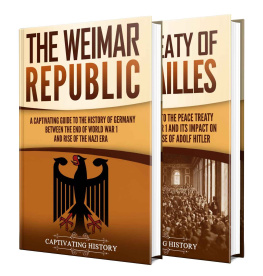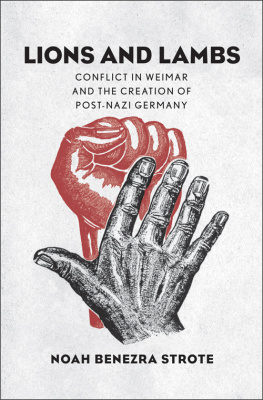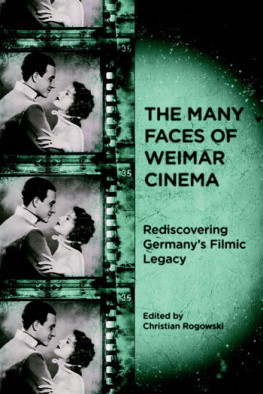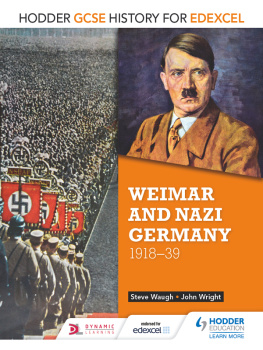The heroic earth : geopolitical thought in Weimar Germany, 1918-1933 / David Thomas Murphy.
p. cm.
Includes bibliographical references and index.
ISBN 0-87338-564-0 (alk. paper)
1. GeopoliticsGermanyHistory20th century. 2. Germany
Politics and government19181933. 3. Haushofer, Karl,
18691946. 4. GermanyHistorical geography. I. Title.
DD240.M86 1997
British Library Cataloging-in-Publication data are available.
The myth of Nazi geopolitics has distorted scholarly understanding of the geopolitical movement in Germany for the last half century. The central elements of that myth were set forth during the Second World War when Western scholars, as they rallied to the fight against Nazism, identified geopolitical ideas as one of the many causes of Nazi imperialism. According to the myth, which persists in scholarly writing about political geography and German history to the present, the militarist geographer Karl Haushofer commanded from the mid-1920s an Institute for Geopolitics at the University of Munich. Using the institute as his tool, he gradually rose to become a sort of diabolical mastermind behind Nazi conquest. From Munich he influenced Hitlers follower Rudolf Hess and introduced Adolf Hitler himself to geopolitical concepts such as Lebensraum while Hitler was imprisoned at Landsberg. Under Haushofers command a staff of major German geographers crafted imperialistic schemes that soon made him the leading supporter and proponent of Nazi expansion and allowed him to shape German political and military strategies during World War II.
Thus understood, this myth does more to mislead than to enlighten about the importance of geopolitics for interwar and wartime Germany. The facts of the myth as presented are half-truths at best. The idea that there was an institute with a staff of major geographers, for example, is quite deceptive. An Arbeitsgemeinschaft, or work group, did exist, but it was not founded until the 1930s; it served primarily to feed news articles to German and foreign press, had few major geographers affiliated with it, and was judged by Haushofer himself to be a failure.
The evidence presented in this study suggests, instead, that geopolitical ideas were most dynamic and significant in the years before 1933, when they prepared Germans to accept what came later, teaching them to think like geopoliticians and providing a convenient, seemingly scientific justification for Nazi aggression. On the one hand, geopolitics flourished in the fertile pluralistic political setting of Weimar democracy, insinuating itself into Weimars modernist discourse and capturing the imaginations of adherents across the political spectrum. On the other hand, geopolitical ideas ossified under the Nazis, losing under the new authoritarian order the dynamism and malleability that had lent them their earlier broad appeal. Though geopolitics certainly played a role in domestic propaganda under the Nazis, and helped shape Raumforschung, or Nazi spatial research and planning, in conquered territories, its importance for the formation of both foreign and domestic policy was greatly overshadowed by the imperatives of race. Therefore, this study is focused upon the development of geopolitical thought in Germany in the decade before Weimar democracy succumbed to national socialism. Geopolitical ideas will be reconsidered in order to understand their rhetorical dimensions and the sources of their appeal, the ways in which they were disseminated, and their place in German politics, culture, and foreign policy before 1933.
The title, The Heroic Earth, is borrowed from the works of a leading geopolitical thinker (Adolf Grabowsky) and was selected to focus attention on the theory of geocentrism, which was the central unifying concept of all geopolitical thought in the period. Geopolitical thinkers, ignoring the tautological and self-contradictory character of much geopolitical theorizing, argued that geography determined the development of political and economic structures. The earth took the role of hero in political-geographic narratives of the geopoliticians, decisively shaping national histories, the characteristic qualities of ethnic groups, and even individual personalities. In this form geopolitical ideas were exploited by the nationalist Right during the Weimar years, but they also exerted a powerful magnetic attraction that reached beyond the confines of the political Right. Academics, writers, and journalists from the moderate Left to the far Right exploited key geopolitical concepts to popularize and support their views. By 1933, geopoliticians had succeeded in infusing geocentrism and other key geopolitical ideas into the Weimar public debate about Germanys political, economic, and cultural future. The natural historiographical urge to explain the catastrophe of national socialism has diverted attention from the socially and politically destructive quality of geopolitical thought during the Weimar years. This work represents an effort to revise historical understanding of the importance of geopolitical ideas in Germany by focusing attention on the years when they first transcended the bounds of German academia to enter the awareness of a broader public.
At the beginning of the 1920s the word geopolitics still retained a flavor of the exotic. It was first used in 1899 by the Swedish political scientist and journalist Rudolf Kjelln, whose prolific translated writings made the term known to German audiences before 1918.
A glance at the German media or into German schools or books in the late 1920s confirms Hettners observation. The Zeitschrift fr Geopolitik, founded by a group of academic geographers in 1924, within a few years enjoyed an annual circulation among people and institutions of influence that fluctuated between three and five thousand over the next decade.
This study is begun in the wake of the German military collapse and the revolutions of 1918 and 1919. Geopolitical theories gained ground slowly over the next few years, acquiring adherents in a variety of academic, political, and media settings. By the time the Republic entered its brief period of relative stability, beginning in 1924, the success of the Zeitschrift fr Geopolitik provided an institutional framework for the dissemination of geopolitical ideas for the next two decades. The decision to conclude in 1933 recognizes the fact that an extensive literature already addresses many aspects of geopolitical thought during the Nazi era and reflects the conviction that geopolitics grew increasingly irrelevant to German society and politics after 1933. Although the Nazis talked about geopolitical ideas, it is incorrect to say that they were guided by them. It seems more often the case that they saw in geopolitics popular slogans and convenient ex post facto rationalizations for courses of policy developed independently of strict geopolitical considerations. It is in the Weimar era, under an open and pluralistic political system, that geopolitical ideas flourished, exhibiting a broadly based appeal and a dynamism that could affect politics.






